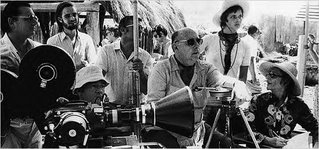 Pictorial Parade/Getty Images
Pictorial Parade/Getty ImagesRoberto Rossellini, center, in Rome in 1971 on the set of “Blaise Pascal” with his first wife, Marcella De Marchis, far right, and Isabella Rossellini, his daughter by his second wife, Ingrid Bergman.
“One can’t live without Rossellini,” a character declares in Bernardo Bertolucci’s 1964 film “Before the Revolution.” Yet, almost three decades after Roberto Rossellini’s death in 1977, most moviegoers in America manage to live without the Italian director, though perhaps not as happily as they might. With the vast majority of his films unavailable for home rental, the father of Italian neo-realism and Isabella Rossellini has been reduced to little more than a cinephile cult figure, a faded saint on an art house fresco.
The retrospective of Rossellini’s film and television work that opens on Wednesday at the Museum of Modern Art may not revive the director’s reputation, but it’s wonderfully welcome nonetheless, an instant, essential event. Organized by the museum and the Cinematheque Ontario, the show runs through Dec. 22 and is slated to travel to Los Angeles and London. It includes a parallel exhibition of Rossellini film posters (some on loan from Ms. Rossellini’s former husband, Martin Scorsese), and encompasses both familiar titles, like the neo-realist classic “Open City” (1945), and some of the more unfamiliar features he made for television after he seemed to abandon the art form he helped revolutionize. .........
.............Seven months later, bankrolled by a countess, with a script partly written by Federico Fellini, he began shooting “Open City,” about the men, women and children in Rome who resisted the German occupation. Production wrapped in May 1945, the same month German forces in Italy surrendered; by early the next year, critics were in raptures over a film in which, as one wrote, “people act like people, not actors.” In The New York Times, Bosley Crowther exulted: “To us who have been accustomed to the slickly manufactured sentiments of Hollywood’s studio-made pictures, the hard simplicity and genuine passion of this film lend to its not unfamiliar story the smashing impact of a shocking exposé.”
“Open City” may no longer shock, but even repeat viewings fail to blunt its force. Shot in black and white in studio sets and on location, the story loosely follows a partisan leader whose acquaintances include the saltiest salt of the earth, among them a neighborhood priest and a pregnant woman played by a magnificent Anna Magnani. ............










No comments:
Post a Comment